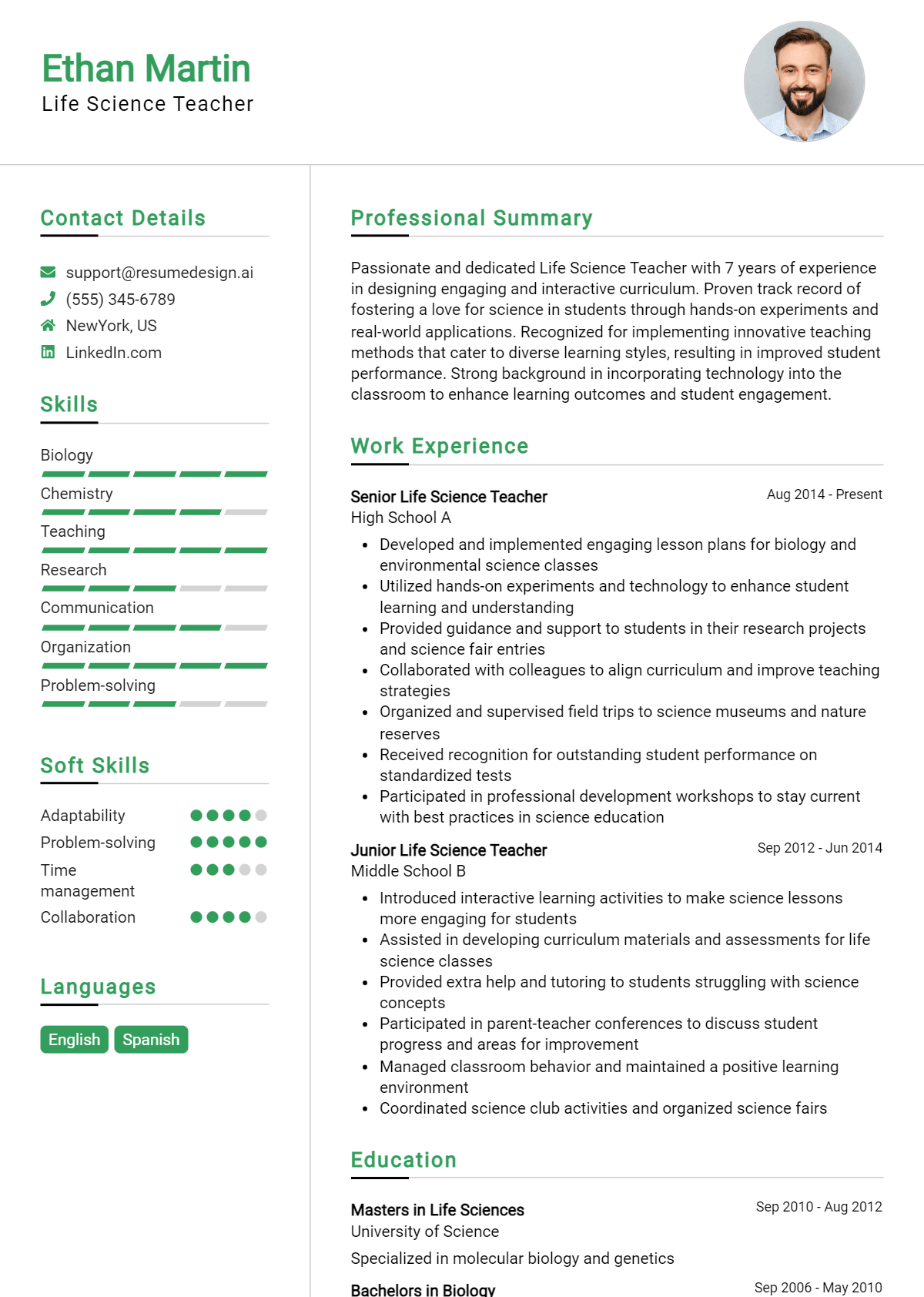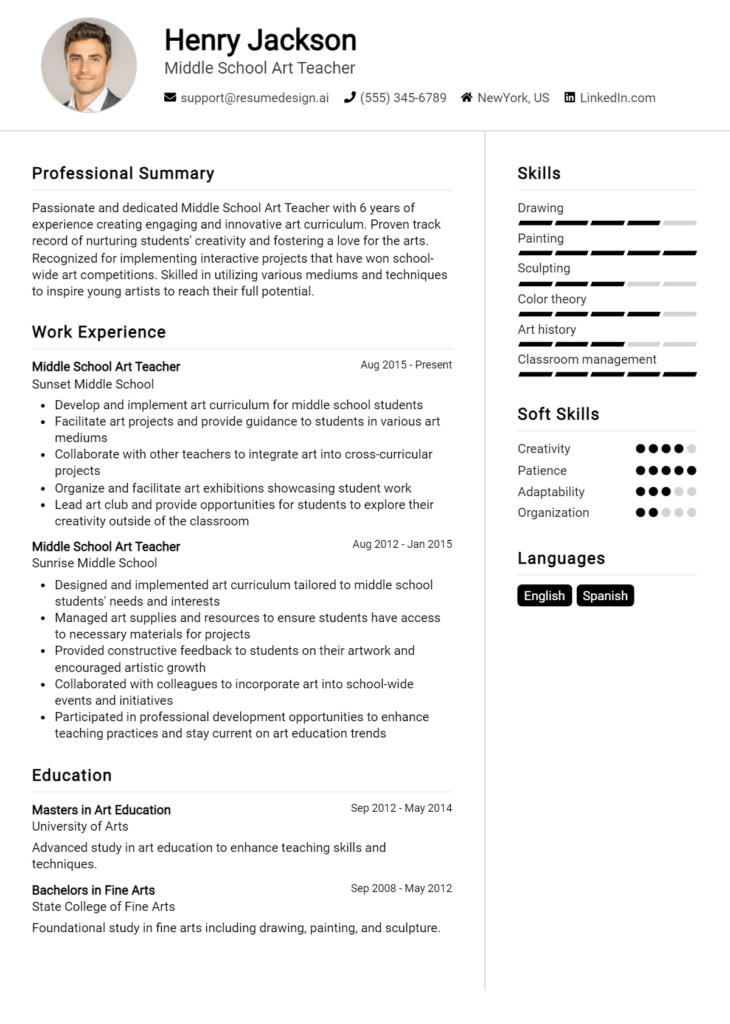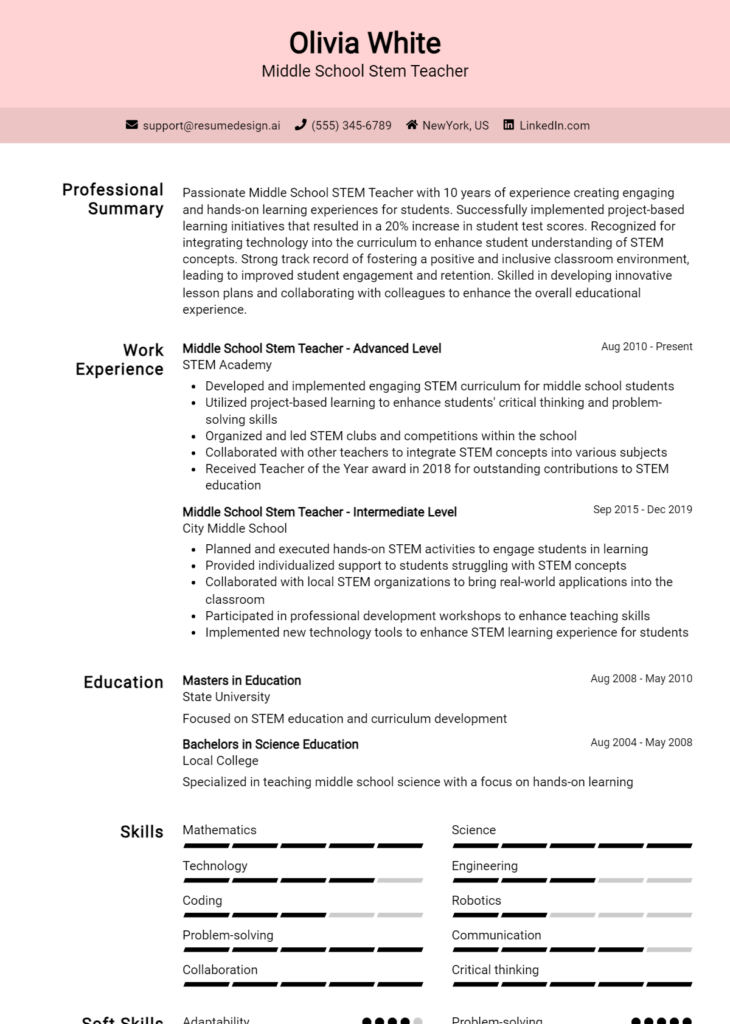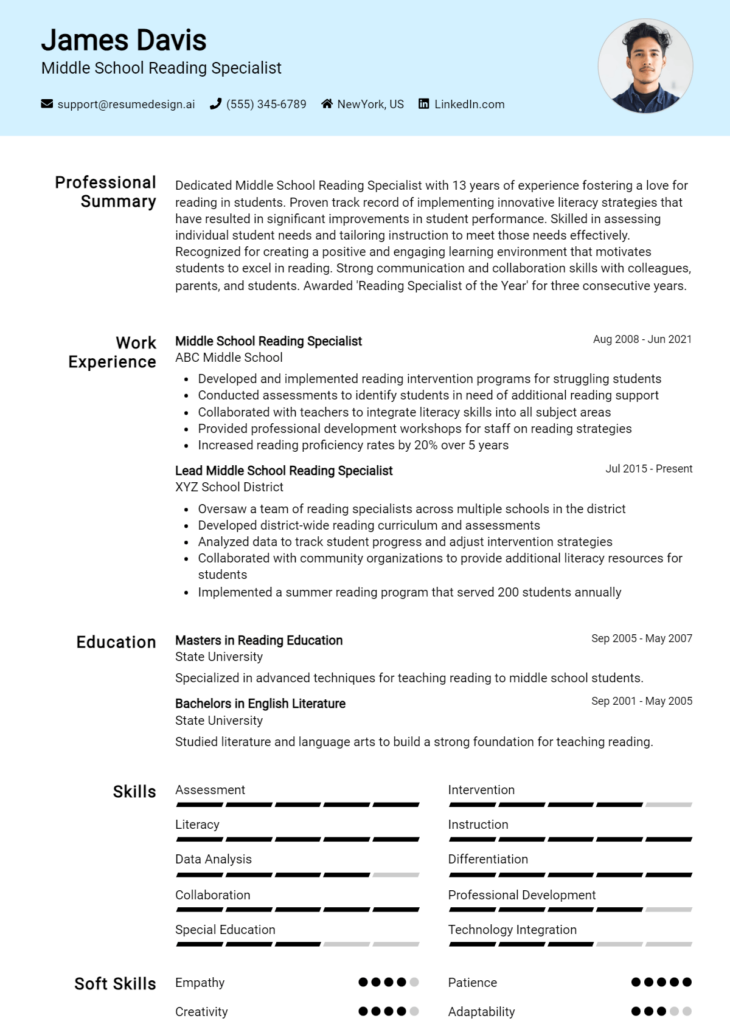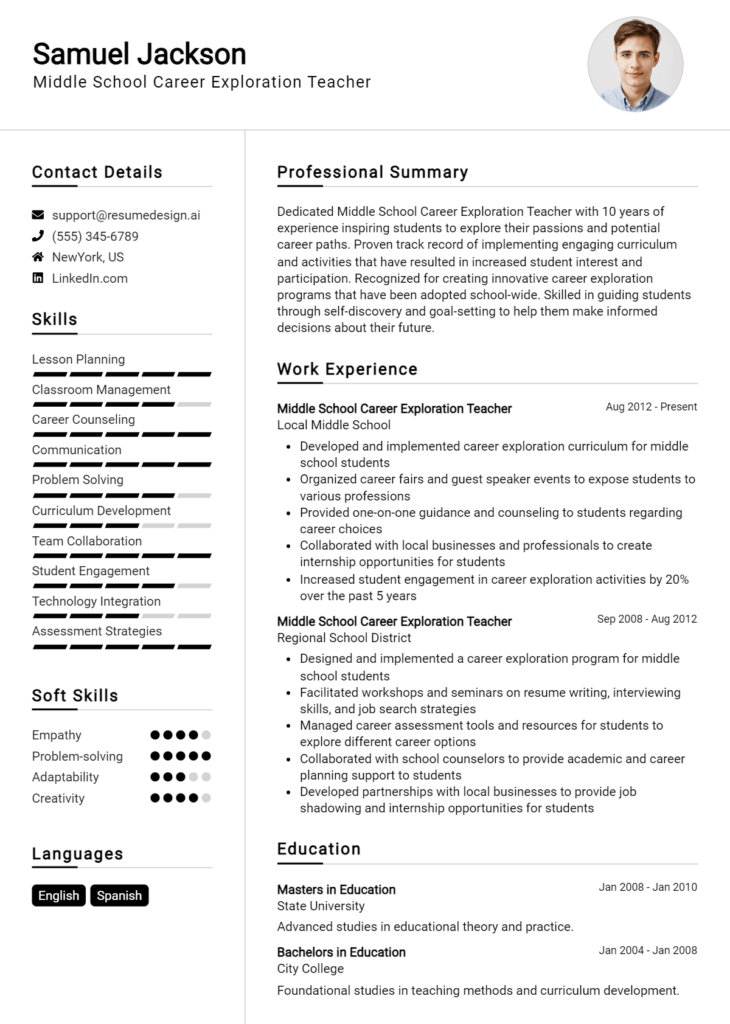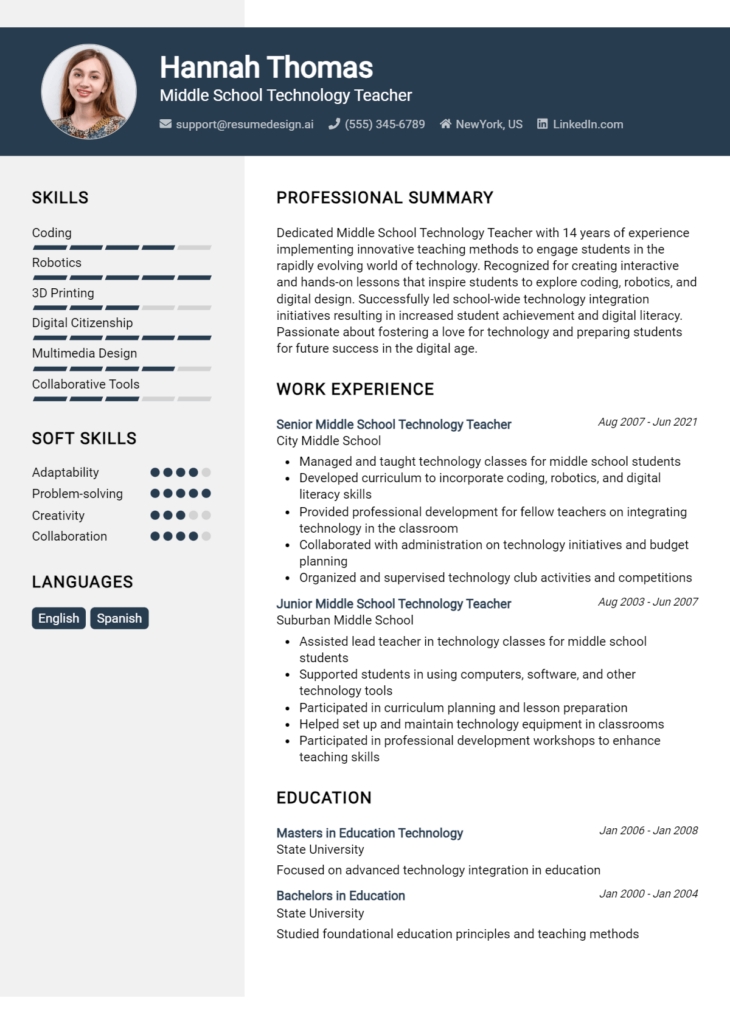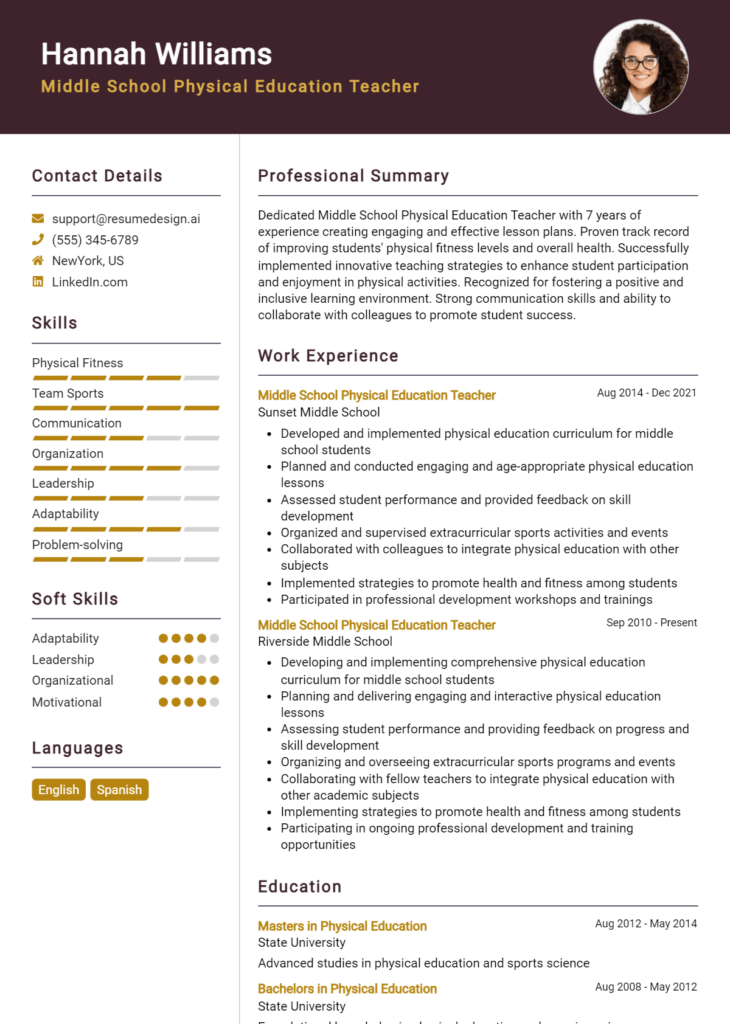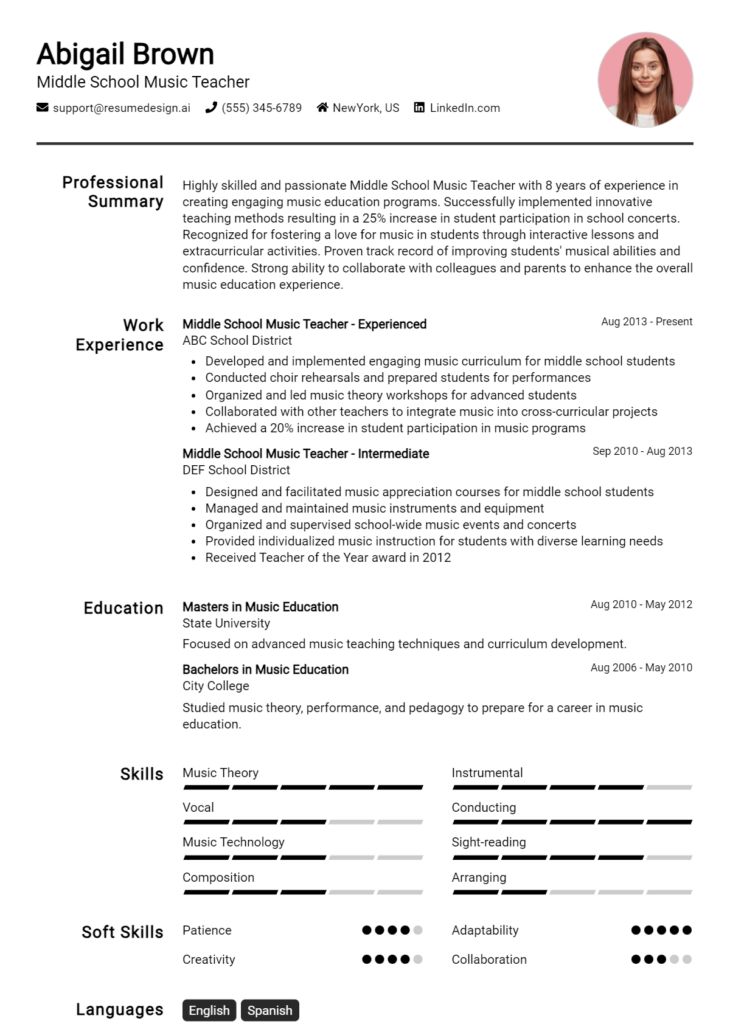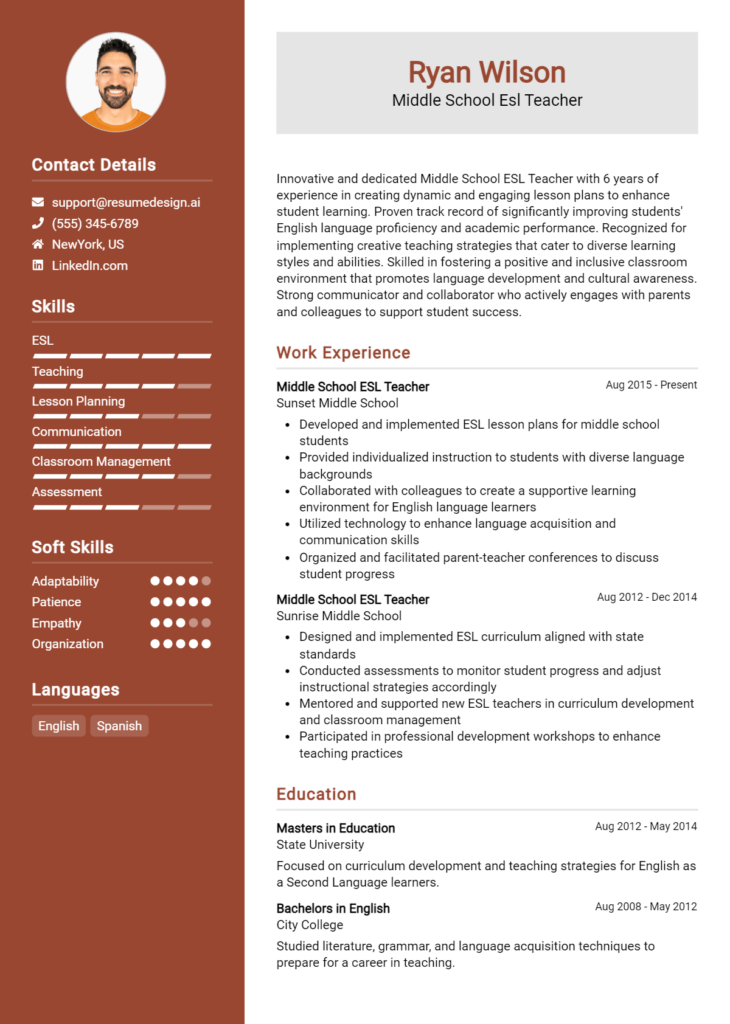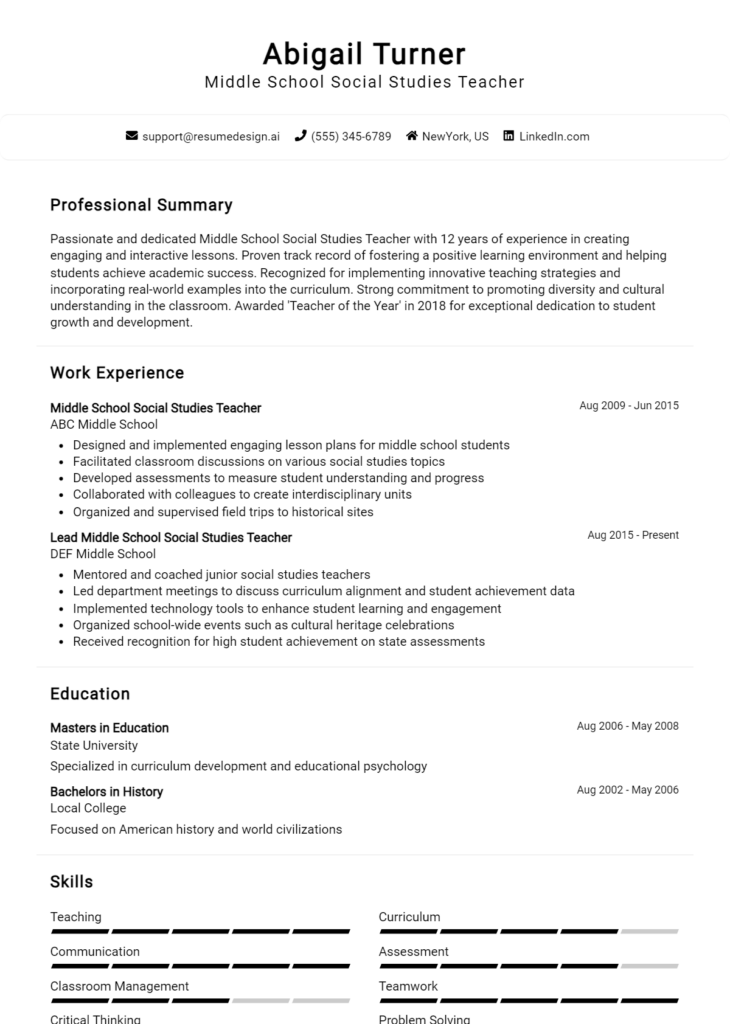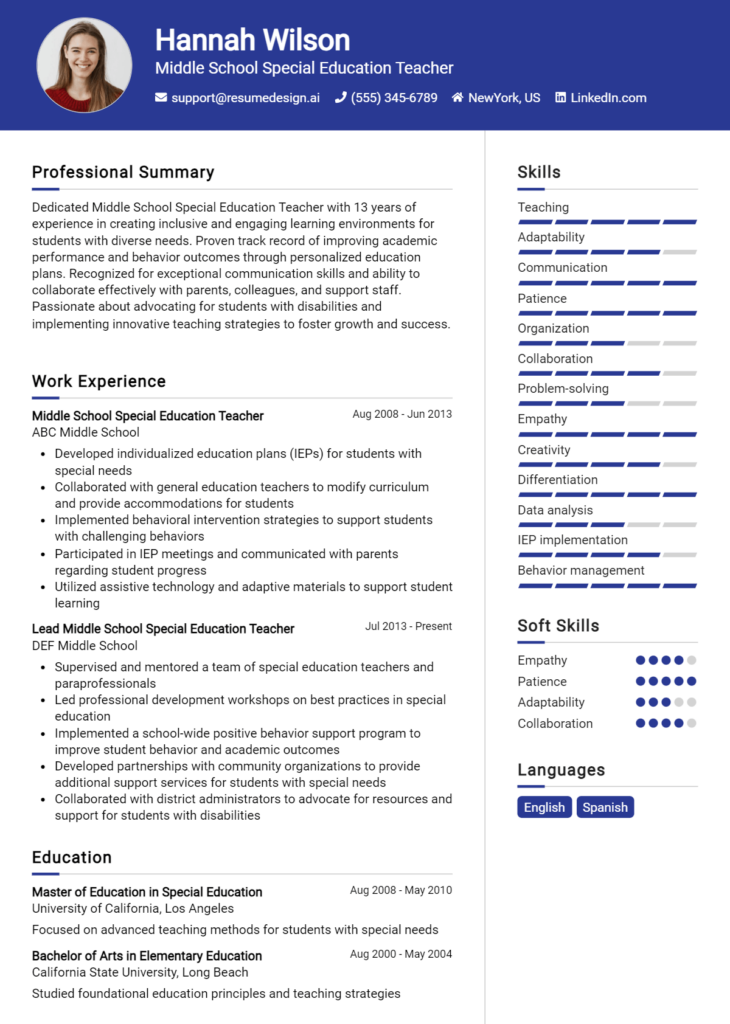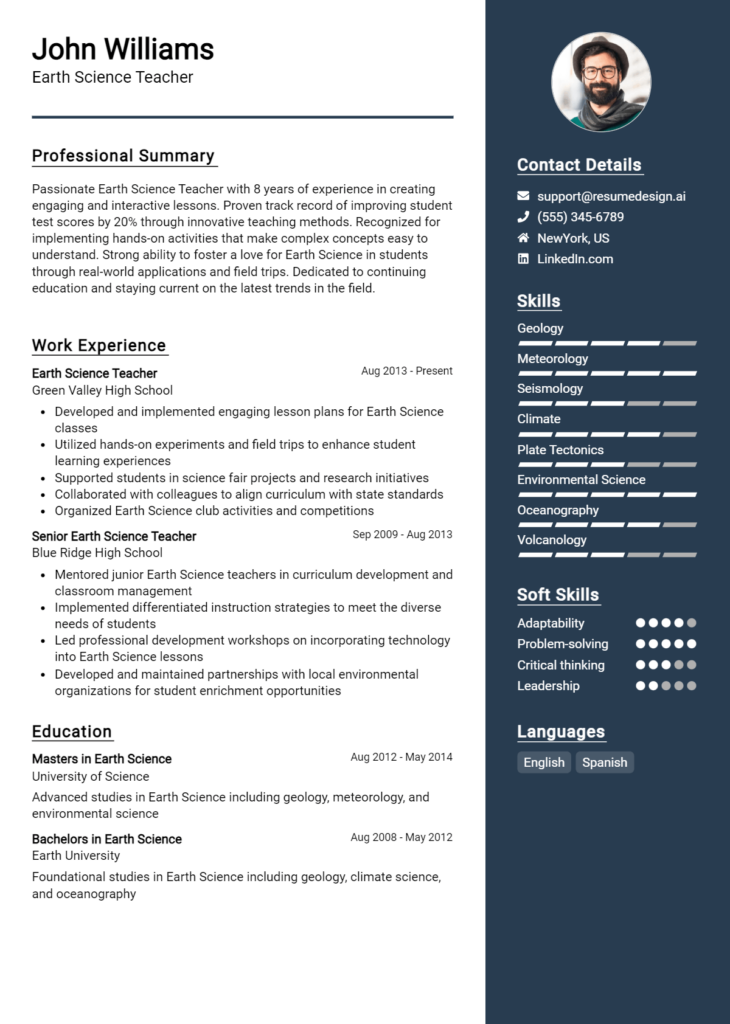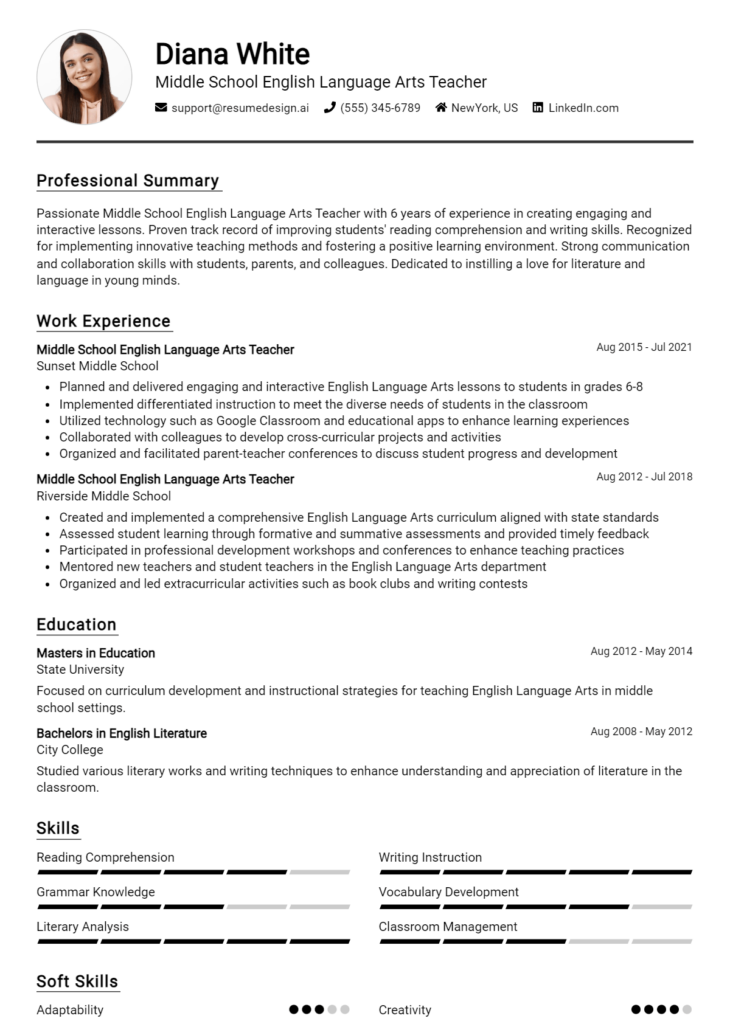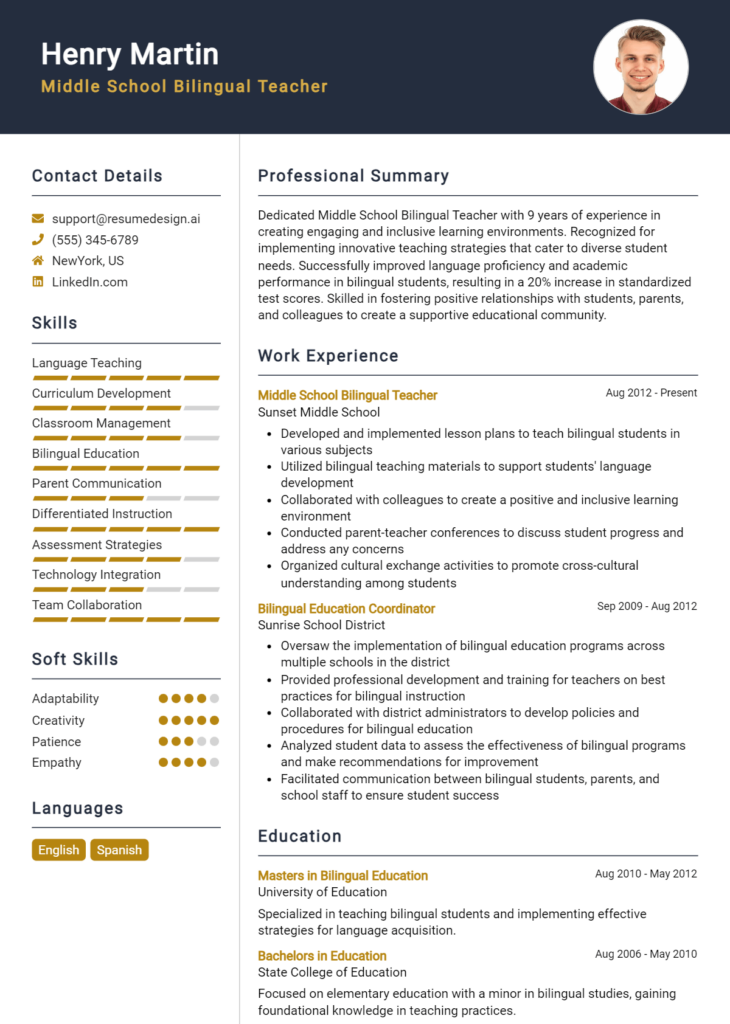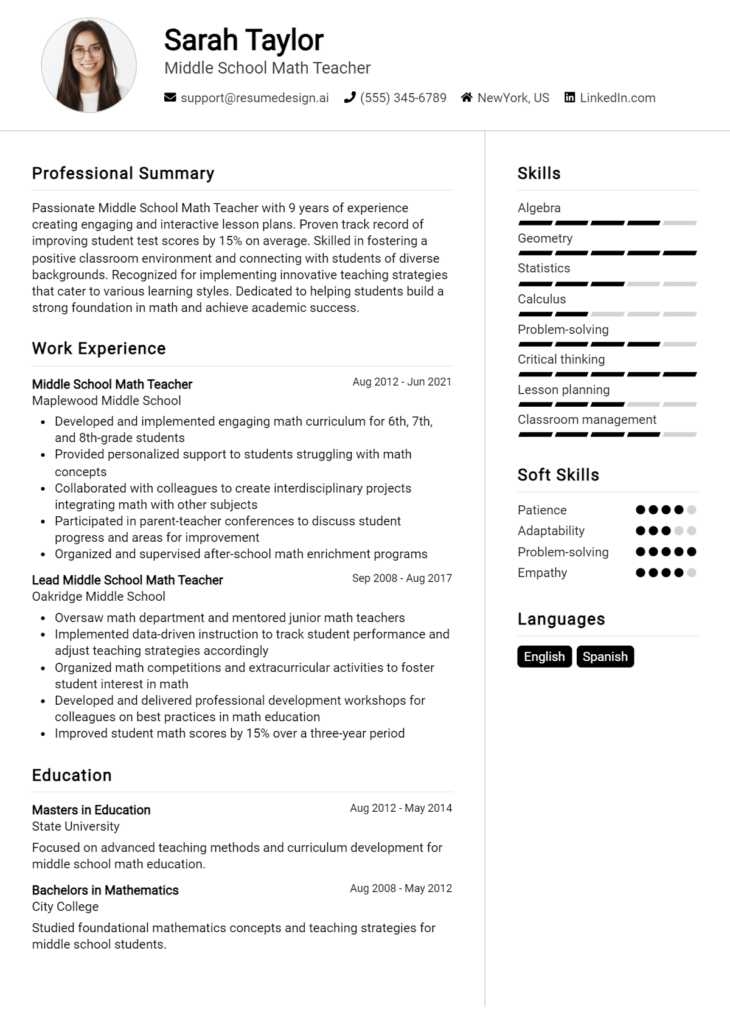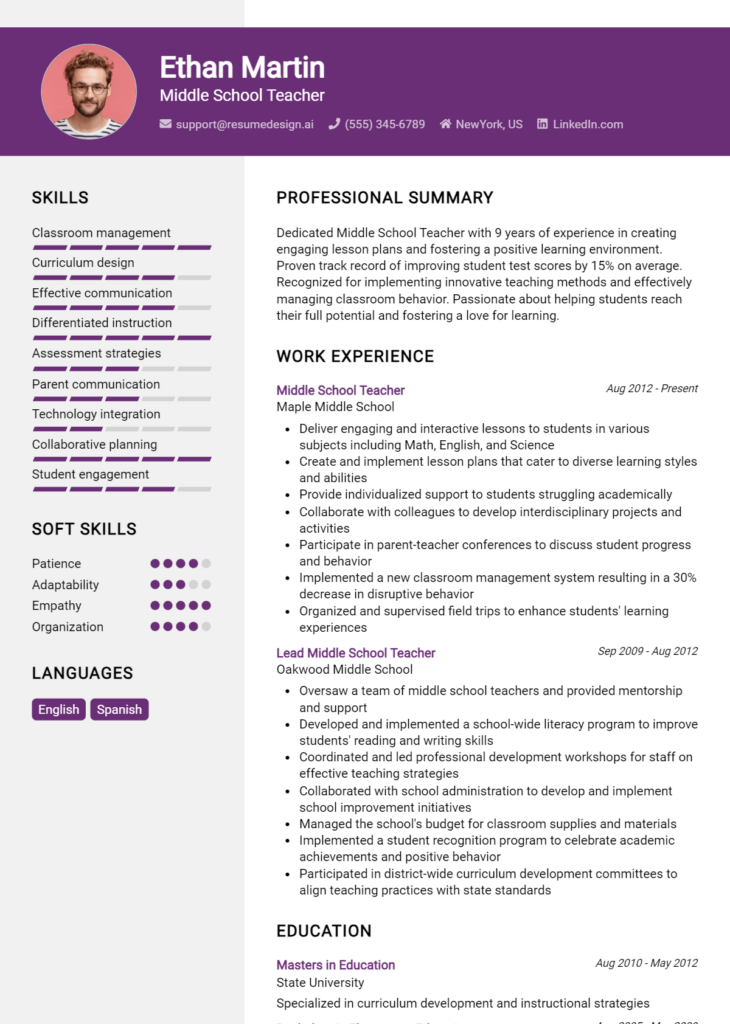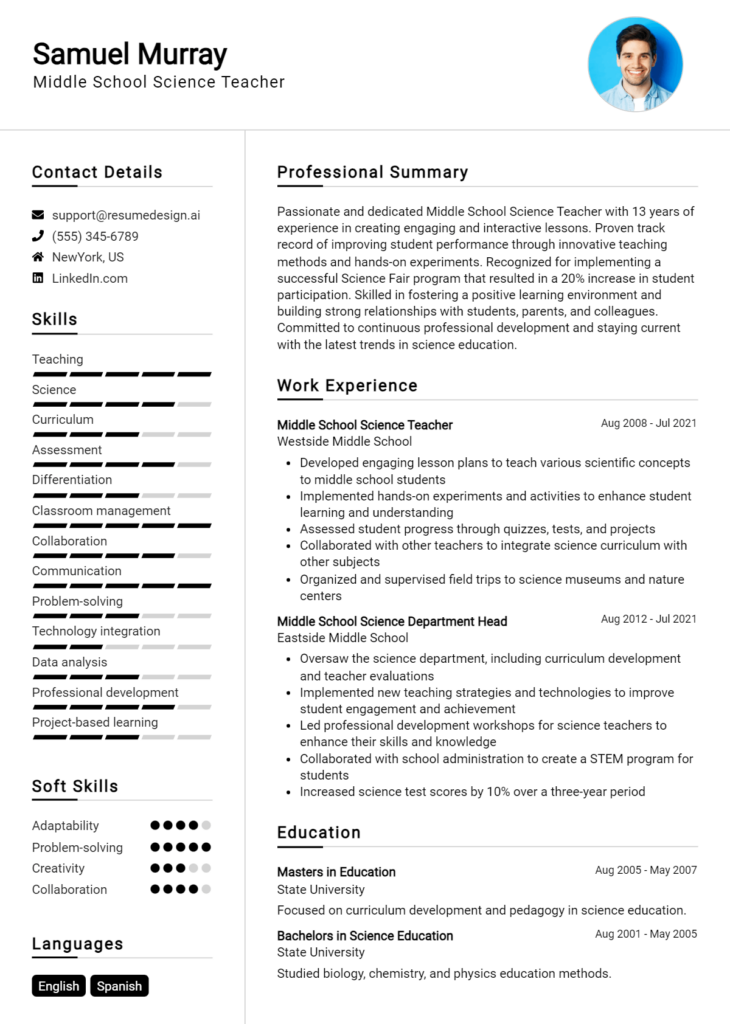Life Science Teacher Core Responsibilities
A Life Science Teacher plays a pivotal role in bridging the gap between scientific disciplines by integrating biology, chemistry, and environmental science into a cohesive curriculum. Key responsibilities include developing lesson plans, delivering engaging lectures, conducting experiments, and assessing student performance. Essential skills encompass technical knowledge, operational planning, and problem-solving abilities, which are crucial for fostering an innovative learning environment. A well-structured resume can effectively highlight these qualifications, contributing to the organization's educational goals.
Common Responsibilities Listed on Life Science Teacher Resume
- Develop and implement comprehensive lesson plans aligned with curriculum standards.
- Conduct laboratory experiments and guide students in scientific inquiry.
- Assess student progress and provide constructive feedback.
- Incorporate technology and multimedia resources into instruction.
- Facilitate discussions on current scientific issues and ethical considerations.
- Collaborate with fellow educators to enhance interdisciplinary learning.
- Organize field trips and hands-on projects to enrich student experiences.
- Maintain a safe and inclusive classroom environment.
- Engage with parents and guardians to discuss student progress.
- Stay updated on advancements in life sciences and educational best practices.
- Participate in professional development and training workshops.
- Support students in developing research skills and scientific literacy.
High-Level Resume Tips for Life Science Teacher Professionals
In the competitive field of education, a well-crafted resume is essential for Life Science Teacher professionals seeking to make a meaningful impact. A resume often serves as the first impression a candidate makes on potential employers, acting as a powerful marketing tool that highlights both skills and achievements. For Life Science Teachers, this document should effectively convey not only subject matter expertise but also a passion for teaching and fostering student engagement. This guide will provide practical and actionable resume tips specifically tailored for Life Science Teacher professionals, helping to ensure your resume stands out in the applicant pool.
Top Resume Tips for Life Science Teacher Professionals
- Tailor your resume to the job description by incorporating relevant keywords and phrases that align with the specific requirements of the position.
- Showcase your relevant experience, including teaching positions, internships, or hands-on laboratory work that demonstrate your expertise in life sciences.
- Quantify your achievements by using specific metrics, such as student performance improvements, curriculum development success, or participation rates in science-related programs.
- Highlight industry-specific skills, such as proficiency in laboratory techniques, knowledge of current scientific research, and the ability to integrate technology into the classroom.
- Include any certifications or endorsements that are relevant to life sciences, including specialized training in biotechnology, environmental science, or health education.
- Emphasize soft skills that are vital for teaching, such as communication, collaboration, and adaptability, providing examples of how you've applied these skills in your teaching practice.
- Incorporate a professional summary at the top of your resume that succinctly captures your teaching philosophy, passion for life sciences, and career goals.
- Use clear and concise language, ensuring that your resume is easy to read and free of jargon that may not be familiar to all hiring managers.
- Keep your resume to one or two pages, focusing on the most relevant and impactful experiences that align with the Life Science Teacher role.
By implementing these tips, Life Science Teacher professionals can significantly increase their chances of landing a job in their field. A targeted and well-structured resume not only showcases qualifications but also conveys enthusiasm and readiness to inspire the next generation of scientists. Take the time to refine your resume, and you’ll be one step closer to securing that ideal teaching position.
Why Resume Headlines & Titles are Important for Life Science Teacher
In the competitive field of education, particularly in the sciences, a well-crafted resume headline or title serves as a critical first impression for life science teachers. A strong headline can instantly capture the attention of hiring managers, succinctly summarizing a candidate's key qualifications and setting the tone for the rest of the resume. It should be concise, relevant, and directly related to the job being applied for, allowing educators to highlight their expertise and commitment to fostering a passion for the life sciences among students.
Best Practices for Crafting Resume Headlines for Life Science Teacher
- Keep it concise: Aim for one impactful phrase that encapsulates your qualifications.
- Be role-specific: Tailor the headline to reflect the life science teaching position you are applying for.
- Highlight key strengths: Include your unique skills, areas of expertise, or notable accomplishments.
- Use relevant keywords: Incorporate industry-specific terms that resonate with hiring managers.
- Showcase your passion: Reflect your enthusiasm for teaching and engaging with students in the life sciences.
- Avoid clichés: Steer clear of overused phrases that fail to distinguish you from other candidates.
- Make it compelling: Use active language that portrays confidence and expertise.
- Align with the job description: Ensure that your headline mirrors the requirements and attributes sought by the employer.
Example Resume Headlines for Life Science Teacher
Strong Resume Headlines
Dedicated Life Science Educator with 10+ Years of Experience in Curriculum Development
Innovative Biology Teacher Committed to Engaging Students Through Hands-On Learning
Dynamic Life Science Instructor Specializing in Environmental Science and Laboratory Techniques
Weak Resume Headlines
Teacher Looking for a Job
Life Science Professional
Strong resume headlines are effective because they immediately convey the candidate's qualifications and unique selling points in a clear and engaging manner. They showcase specific skills and experiences relevant to the life science teaching role, making it easier for hiring managers to recognize the applicant's potential fit for the position. In contrast, weak headlines tend to be vague and generic, lacking the specificity and impact needed to stand out in a competitive job market. This can lead to a missed opportunity for candidates who fail to articulate their strengths and expertise effectively.
Writing an Exceptional Life Science Teacher Resume Summary
A resume summary is a vital component for a Life Science Teacher, as it serves as the first impression for hiring managers. A strong summary quickly captures attention by succinctly showcasing key skills, relevant experience, and notable accomplishments that align with the role. It should provide a snapshot of the candidate’s qualifications, highlighting their ability to inspire and educate students in the complex field of life sciences. A concise and impactful summary tailored specifically to the job description can effectively differentiate a candidate from others, making it an essential tool in the job application process.
Best Practices for Writing a Life Science Teacher Resume Summary
- Quantify Achievements: Use numbers and statistics to demonstrate your impact, such as improved student performance or curriculum development success.
- Focus on Relevant Skills: Highlight skills that are specifically mentioned in the job description, such as project-based learning, lab techniques, or curriculum design.
- Tailor to the Job Description: Customize your summary for each position you apply for, aligning your experiences with the employer's needs.
- Be Concise: Keep your summary brief, ideally 2-4 sentences, focusing on the most important aspects of your career.
- Use Action Words: Start sentences with strong action verbs to convey your contributions effectively.
- Showcase Passion for Teaching: Express your enthusiasm for teaching and mentoring students in the life sciences field.
- Include Certifications: Mention any relevant certifications or degrees that enhance your qualifications as a life science educator.
- Reflect Professional Growth: Briefly indicate how your experiences have shaped your teaching philosophy and effectiveness.
Example Life Science Teacher Resume Summaries
Strong Resume Summaries
Dedicated Life Science Teacher with over 8 years of experience in developing engaging curriculum that has increased student test scores by 25% on average. Skilled in integrating technology into lessons to enhance learning and foster critical thinking skills.
Dynamic educator with a Master’s degree in Biological Sciences and a proven track record of implementing innovative teaching strategies that improved student engagement by 30%. Passionate about nurturing a love for science through hands-on experiments and real-world applications.
Experienced Life Science Teacher with a commitment to fostering a supportive learning environment. Successfully led a school-wide initiative that resulted in a 40% increase in student participation in science fairs, demonstrating effectiveness in promoting student interest in the sciences.
Weak Resume Summaries
Life Science Teacher with experience in teaching various subjects. I am passionate about education and enjoy working with students.
Enthusiastic teacher looking for a position in a school system. I have worked with students and have a background in science.
The strong resume summaries are considered effective because they provide specific examples of achievements, quantify results, and clearly articulate relevant skills and experiences. They are tailored to the teaching role and illustrate the candidate's direct impact on student learning and engagement. In contrast, the weak summaries lack detail and specificity, making them generic and unmemorable, which fails to capture the attention of hiring managers.
Work Experience Section for Life Science Teacher Resume
The work experience section of a Life Science Teacher resume is pivotal in demonstrating the candidate's practical expertise and ability to contribute effectively to an educational environment. This section not only highlights the technical skills acquired through previous roles but also reflects the candidate's capacity to manage teams and deliver high-quality educational products. By quantifying achievements and aligning experiences with industry standards, candidates can provide clear evidence of their impact and effectiveness in the classroom, making them more attractive to potential employers.
Best Practices for Life Science Teacher Work Experience
- Focus on quantifiable results, such as improved student test scores or successful project completions.
- Highlight specific technical skills relevant to life sciences, such as laboratory techniques or curriculum development.
- Emphasize collaboration with colleagues, administrators, and community members to enrich the educational environment.
- Use action verbs to convey a sense of initiative and leadership in previous roles.
- Align experiences with industry standards and educational best practices to demonstrate relevance.
- Include professional development experiences that showcase ongoing learning in the life sciences field.
- Tailor each experience to the specific job you are applying for, emphasizing the most relevant accomplishments.
- Maintain clarity and conciseness to ensure that the information is easily digestible for potential employers.
Example Work Experiences for Life Science Teacher
Strong Experiences
- Developed and implemented a new biology curriculum that increased student engagement by 30% and improved overall test scores by 15% over two academic years.
- Led a team of five educators in a science fair project that resulted in three students winning regional awards, fostering collaboration and innovation among students and staff.
- Conducted a series of hands-on laboratory workshops that enhanced students' practical skills, leading to a 25% increase in student participation in advanced science courses.
- Collaborated with local universities to create internship opportunities for students, resulting in a 40% increase in student applications for science-related programs.
Weak Experiences
- Taught various life science subjects without specifying methods or outcomes.
- Participated in team meetings with no mention of contributions or results.
- Helped students with lab work without detailing the skills taught or improvements observed.
- Engaged in professional development activities with no description of their relevance or impact on teaching practice.
The examples of strong experiences are considered effective because they provide specific, quantifiable outcomes that demonstrate the candidate's impact on student learning and collaboration within the school. In contrast, the weak experiences lack detail and measurable results, making it difficult for potential employers to gauge the candidate's effectiveness or contributions to the educational environment.
Education and Certifications Section for Life Science Teacher Resume
The education and certifications section in a Life Science Teacher Resume plays a crucial role in establishing the candidate's qualifications and expertise in the field. This section not only highlights the individual's academic background but also showcases industry-relevant certifications and a commitment to continuous learning. By providing details about relevant coursework, specialized training, and recognized credentials, candidates can significantly enhance their credibility and demonstrate their alignment with the requirements of the teaching role. This information is vital for employers seeking educators who are well-prepared to engage students in the complexities of life sciences.
Best Practices for Life Science Teacher Education and Certifications
- List degrees in reverse chronological order, starting with the most recent.
- Include relevant coursework that directly pertains to life sciences, biology, or education.
- Highlight industry-recognized certifications such as National Board Certification or state-specific teaching licenses.
- Incorporate specialized training in areas like environmental science, biotechnology, or health sciences.
- Emphasize ongoing professional development, such as workshops or additional certifications.
- Ensure all listed qualifications are up-to-date and relevant to the current educational landscape.
- Use clear and concise language to describe each educational achievement and certification.
- Avoid including outdated or irrelevant certifications that do not enhance your qualifications for the role.
Example Education and Certifications for Life Science Teacher
Strong Examples
- M.S. in Biological Sciences, University of XYZ, 2021
- Certified Life Science Teacher, State Board of Education, 2022
- Advanced Placement (AP) Biology Coursework, Completed 2020
- Certification in Environmental Education, National Environmental Education Foundation, 2023
Weak Examples
- B.A. in History, University of ABC, 2010
- Certification in Microsoft Office Suite, Completed 2018
- Workshop on Classroom Management Strategies, 2015 (not specific to life sciences)
- High School Diploma, Graduated 2005
The examples listed as strong are considered relevant and current, showcasing degrees and certifications that directly align with the responsibilities of a Life Science Teacher. They highlight advanced education and specialized training that enhance the candidate's qualifications. Conversely, the weak examples reflect outdated or irrelevant educational backgrounds and certifications that do not contribute to the candidate's ability to teach life sciences effectively. These distinctions are critical for demonstrating a candidate's preparedness and suitability for the role.
Top Skills & Keywords for Life Science Teacher Resume
As a Life Science Teacher, possessing the right skills is crucial for effectively imparting knowledge and inspiring students in the fascinating world of biology, ecology, and related subjects. A well-crafted resume that highlights both hard and soft skills can significantly increase your chances of landing a teaching position. These skills not only showcase your expertise in life sciences but also demonstrate your ability to engage and support students in their learning journey. Highlighting these skills in your resume allows potential employers to see your well-rounded capabilities and your dedication to fostering an enriching educational environment.
Top Hard & Soft Skills for Life Science Teacher
Soft Skills
- Communication
- Empathy
- Adaptability
- Leadership
- Collaboration
- Problem-solving
- Creativity
- Time management
- Critical thinking
- Organization
Hard Skills
- Knowledge of biological concepts
- Curriculum development
- Laboratory skills
- Data analysis
- Technology integration in teaching
- Classroom management
- Assessment and evaluation techniques
- Research skills
- First aid and safety protocols
- Knowledge of environmental science
By incorporating these skills into your resume, along with relevant work experience, you can effectively demonstrate your qualifications and readiness to excel as a Life Science Teacher.
Stand Out with a Winning Life Science Teacher Cover Letter
Dear [Hiring Manager's Name],
I am writing to express my enthusiasm for the Life Science Teacher position at [School Name], as advertised on [Job Board/Website]. With a strong academic background in biological sciences and over [X years] of teaching experience, I am confident in my ability to inspire students and cultivate a passion for life sciences within the classroom. My commitment to fostering an engaging and interactive learning environment aligns perfectly with [School Name]'s mission to promote academic excellence and personal growth among its students.
Throughout my career, I have developed and implemented innovative lesson plans that not only meet state curriculum standards but also capture the interest of my students. I believe in using a variety of teaching methods, including hands-on experiments, multimedia resources, and collaborative projects, to accommodate diverse learning styles. At [Previous School Name], I successfully led a project-based learning initiative that resulted in a significant increase in student engagement and achievement in life science topics. I am dedicated to supporting each student's individual learning journey, ensuring they gain a deep understanding of critical scientific concepts and their relevance to real-world issues.
In addition to my teaching skills, I am an active participant in the school community, collaborating with fellow educators to enhance the overall educational experience. I have contributed to curriculum development, organized science fairs, and mentored students in extracurricular science clubs. My passion for life sciences extends beyond the classroom, as I continuously seek professional development opportunities to stay current with advancements in the field and effective teaching strategies. I am excited about the possibility of bringing my expertise and enthusiasm to [School Name] and contributing to a vibrant learning environment.
Thank you for considering my application. I look forward to the opportunity to discuss how my background, skills, and teaching philosophy can align with the goals of [School Name]. I am eager to contribute to the growth and success of your students as they explore the fascinating world of life sciences.
Sincerely,
[Your Name]
[Your Phone Number]
[Your Email Address]
Common Mistakes to Avoid in a Life Science Teacher Resume
When crafting a resume for a Life Science Teacher position, it's essential to present your qualifications and experiences effectively. Many applicants make common mistakes that can undermine their chances of landing an interview. By avoiding these pitfalls, you can create a compelling resume that highlights your expertise in life sciences and your teaching capabilities. Here are some mistakes to steer clear of:
Generic Objective Statements: Using vague or generic objective statements can make your resume blend in with others. Tailor your objective to reflect your passion for life sciences and your teaching philosophy.
Ignoring Relevant Experience: Failing to highlight specific teaching experiences or relevant roles can diminish your candidacy. Ensure you include any hands-on teaching, curriculum development, or laboratory experience related to life sciences.
Lack of Quantifiable Achievements: Not including quantifiable achievements can make your resume less impactful. Whenever possible, use numbers to showcase student success rates, improvements in test scores, or participation in science fairs.
Overly Complex Language: Using jargon or overly complex language can confuse hiring committees. Aim for clear and concise language that effectively communicates your skills and experiences.
Neglecting Professional Development: Omitting any professional development or continuing education can signal a lack of commitment to growth. Include workshops, certifications, or courses that enhance your life science knowledge and teaching skills.
Ignoring Formatting Consistency: Inconsistent formatting can make your resume appear unprofessional. Use a uniform font, bullet points, and spacing to ensure your resume is easy to read and visually appealing.
Failing to Customize for Each Application: Sending out a one-size-fits-all resume can be detrimental. Tailor your resume for each position, emphasizing the skills and experiences that align with the specific job requirements.
Not Proofreading: Grammatical errors and typos can create a negative impression. Always proofread your resume carefully or have someone else review it to catch any mistakes before submission.
Conclusion
In conclusion, being an effective Life Science Teacher requires a deep understanding of biological concepts, the ability to engage students through innovative teaching methods, and a commitment to fostering a love for science. Throughout this article, we have explored the essential skills and qualifications necessary for this role, including strong communication abilities, adaptability, and a passion for mentoring students.
As you reflect on your journey as a Life Science Teacher, it's crucial to ensure that your resume effectively highlights your achievements and skills. Take the opportunity to review your Life Science Teacher Resume to make sure it aligns with the best practices discussed.
To assist you in this process, consider utilizing the available resources such as resume templates, which can help you create a visually appealing layout; the resume builder, designed to streamline the resume creation process; resume examples that can inspire you with effective content ideas; and cover letter templates to complement your application.
Take action today and refine your resume to showcase your dedication and expertise in the field of life sciences!

